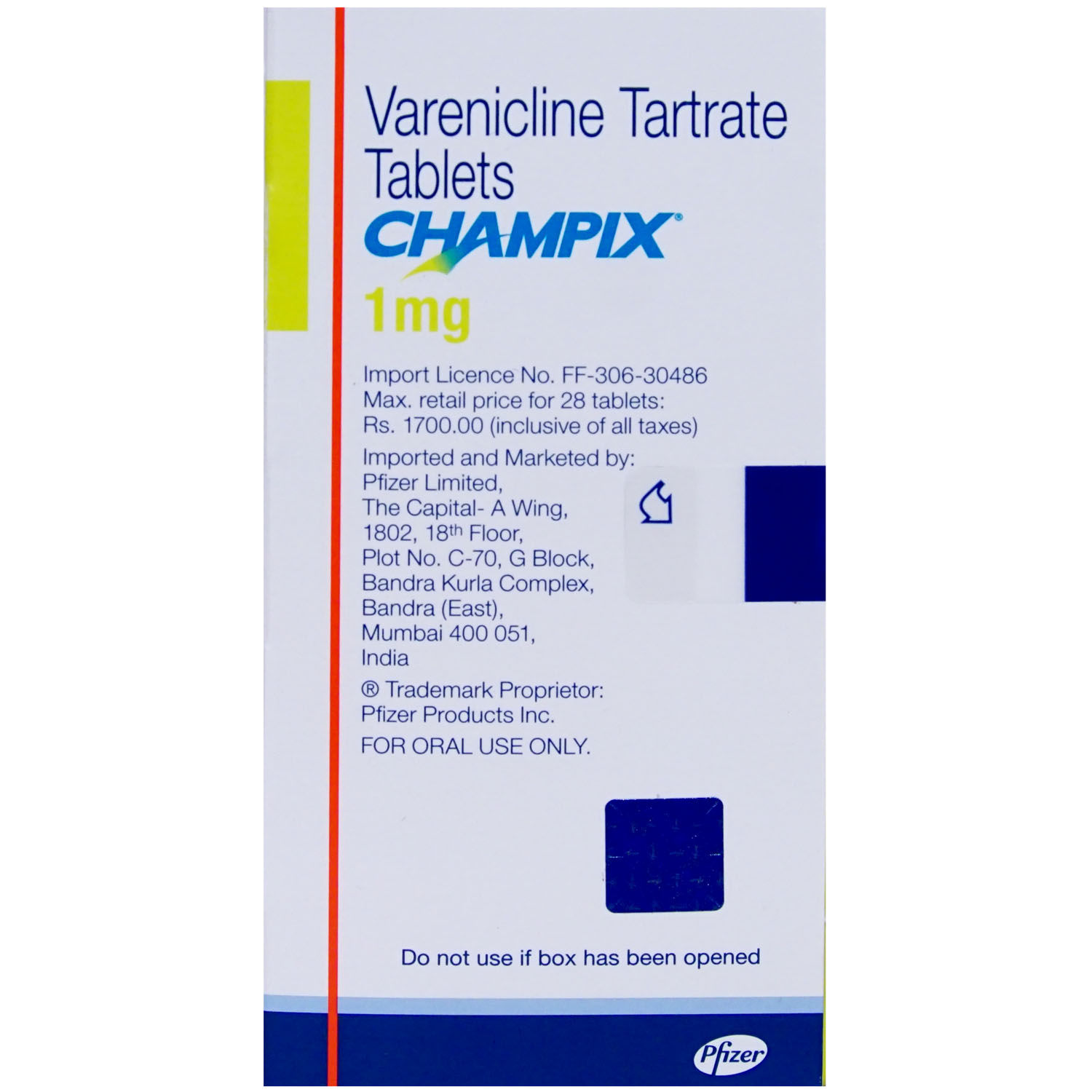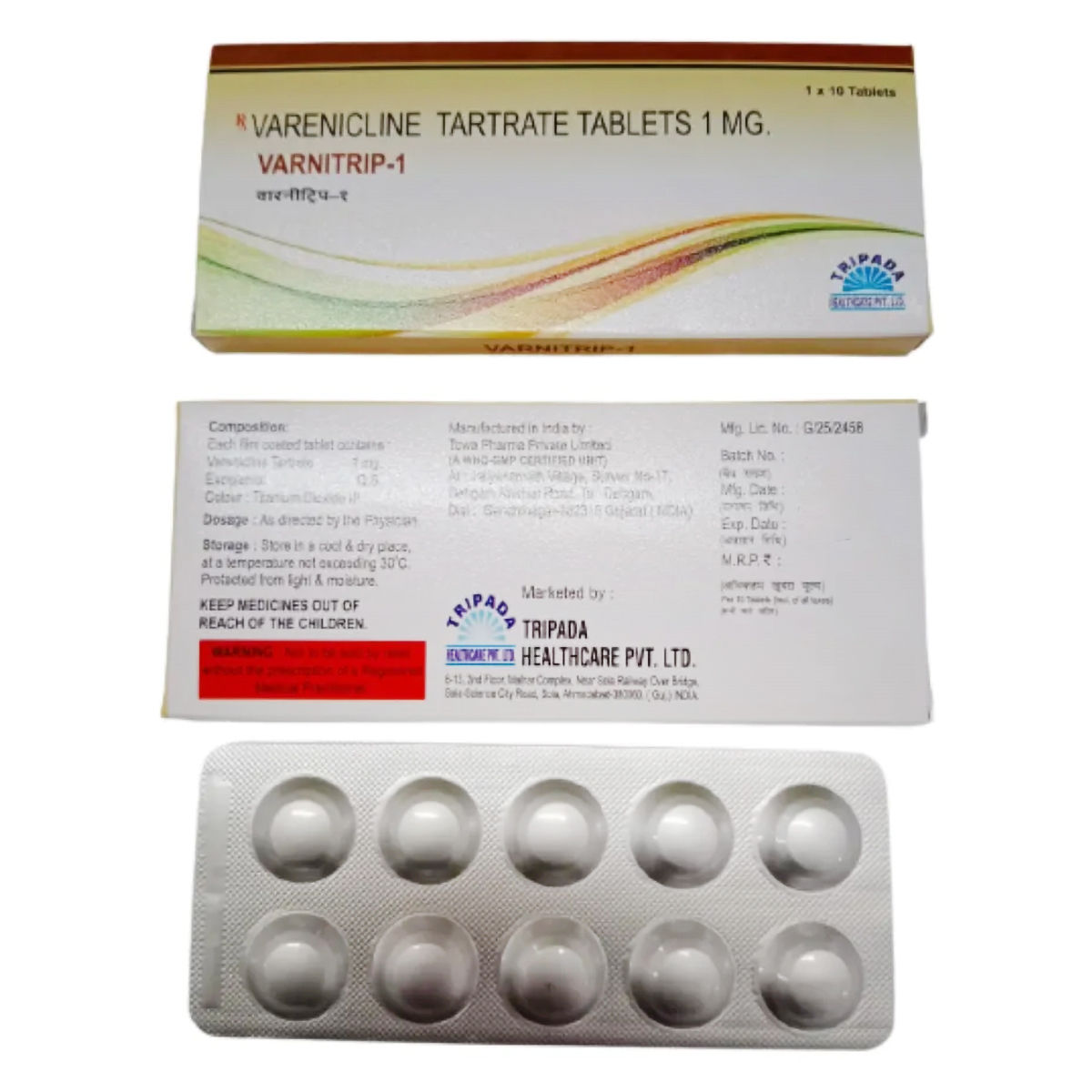Varenicline Tartrate
About Varenicline Tartrate
Varenicline Tartrate belongs to a group of medicines called ‘smoking cessation aids’ used to reduce the craving to smoke and relieve withdrawal symptoms associated with quitting smoking. Nicotine is a chemical present in tobacco that causes addiction. Taking nicotine through smoking or chewing tobacco for a prolonged period causes nicotine addiction, which increases the risk of various medical problems like heart disease, lung disease, and cancer.
Varenicline Tartrate contains Varenicline tartrate which works by stimulating nicotine receptors in the brain and mimics the effect of nicotine. This produces an effect that decreases the urge to smoke and relieves withdrawal symptoms after quitting smoking.
Take Varenicline Tartrate as prescribed by your doctor. You are advised to take Varenicline Tartrate for as long as your doctor has prescribed it for you based on your medical condition. In some cases, you may experience nausea, dizziness, headache, inflammation of the throat and nose, difficulty sleeping, dry mouth, vomiting, stomach pain, or cough. Most of these side effects of Varenicline Tartrate do not require medical attention and gradually resolve over time. However, if the side effects persist or worsen, please consult your doctor.
If you are allergic to Varenicline Tartrate or any other medicines, please tell your doctor. If you have severe kidney or liver disease, inform your doctor before taking Varenicline Tartrate. Please consult a doctor if you are pregnant or breastfeeding before taking Varenicline Tartrate. Varenicline Tartrate is not recommended for children below 18 years. Avoid drinking alcohol while taking Varenicline Tartrate as it may increase intoxicating effects.
Uses of Varenicline Tartrate
Medicinal Benefits
Varenicline Tartrate contains Varenicline tartrate, which works by stimulating nicotinic receptors in the brain and mimics the effect of nicotine. This produces an effect that decreases the urge to smoke and relieves withdrawal symptoms after quitting smoking. Also, Varenicline Tartrate prevents nicotine from acting on nicotinic receptors. Thereby, it reduces the enjoyment of cigarettes if you smoke while taking Varenicline Tartrate.
Directions for Use
Storage
Side Effects of Varenicline Tartrate
- Nausea
- Dizziness
- Headache
- Inflammation of the throat and nose
- Difficulty sleeping
- Dry mouth
- Vomiting
- Stomach pain
- Cough
Drug Warnings
If you are allergic to Varenicline Tartrate or any other medicines, please tell your doctor. If you have severe kidney or liver disease, inform your doctor before taking Varenicline Tartrate. Please consult a doctor if you are pregnant or breastfeeding before taking Varenicline Tartrate. Varenicline Tartrate is not recommended for children below 18 years. Avoid drinking alcohol while taking Varenicline Tartrate as it may increase intoxicating effects. If you develop any behavioural changes or suicidal thoughts, avoid taking Varenicline Tartrate and consult a doctor immediately.
Drug Interactions
Drug-Drug Interaction: Varenicline Tartrate may interact with a blood thinner (warfarin), antidiabetic drug (insulin), bronchodilators (theophylline), and antacid (cimetidine).
Drug-Food Interaction: Avoid consumption of alcohol while taking Varenicline Tartrate as it may increase intoxicating effects.
Drug-Disease Interaction: If you have kidney or liver problems, inform your doctor before taking Varenicline Tartrate.
Drug-Drug Interactions Checker List:
Safety Advice

Alcohol
unsafeYou are recommended to avoid alcohol consumption while taking Varenicline Tartrate as it may increase intoxicating effects.

Pregnancy
cautionIt is recommended to avoid taking Varenicline Tartrate if you are pregnant. However, please consult your doctor if you are pregnant before taking Varenicline Tartrate.

Breast Feeding
cautionVarenicline Tartrate may be excreted in human milk. Therefore, please consult a doctor if you are breastfeeding as it is given to breastfeeding mothers only if the doctor thinks benefits are greater than risks.

Driving
unsafeVarenicline Tartrate may cause drowsiness, dizziness or temporary loss of consciousness. Therefore, avoid driving if you experience any of these effects after taking Varenicline Tartrate.

Liver
cautionTake Varenicline Tartrate with caution, especially if you have a history of liver diseases/conditions. The dose may be adjusted by your doctor as required.

Kidney
cautionTake Varenicline Tartrate with caution, especially if you have a history of kidney diseases/conditions. The dose may be adjusted by your doctor as required.

Children
unsafeVarenicline Tartrate is not recommended for children below 18 years as the safety and effectiveness were not established.
Habit Forming
Diet & Lifestyle Advise
- Tobacco inhibits the absorption of important vitamins, and nutrients, such as calcium, vitamins C and D. Thus, take more fruits and vegetables into the diet, which will help to restore these nutrients and reduce cravings to smoke.
- Ginseng could weaken dopamine, a neurotransmitter in the brain that is connected with pleasure and is released during tobacco consumption. Taking ginseng tea could reduce the craving for smoking.
- Chewing gum and mints are the best way to keep your mouth busy, especially when you feel the urge to smoke, so try to chew gums more.
- Physical workouts can help a person overcome tobacco cravings. When a person gets involved in physical exercise like cycling, running, and walking, their attention gets diverted to exercise, and they do not feel the urge to take nicotine for some time.
Patients Concern
Disease/Condition Glossary
Tobacco (nicotine) addiction: Smoking or chewing tobacco is both a psychological habit and physical dependence. Tobacco contains a chemical called 'nicotine' which is short-lived but highly addictive, and its regular usage can make a person crave it. Breathing or chewing tobacco provides a rush of adrenaline in the bloodstream, and it also triggers dopamine that is associated with the pleasure and reward centre of the brain. Regular nicotine consumption is hazardous for health and puts a person at high risk of lung and heart diseases. However, quitting nicotine is not an easy task. It causes withdrawal symptoms in the body, including irritability, frustration, anger, anxiety, difficulty concentrating, increased appetite, restlessness, depressed mood and insomnia (sleeplessness or lack of sleep).
FAQs
Varenicline Tartrate belongs to a group of medicines called smoking cessation aids used to reduce the craving to smoke and relieve withdrawal symptoms associated with quitting smoking.
Varenicline Tartrate contains Varenicline tartrate that acts as a smoking cessation aid. It works by stimulating nicotine receptors in the brain and mimics the effect of nicotine. This produces an effect that decreases the urge to smoke and relieves withdrawal symptoms after quitting smoking.
You are not recommended to take cimetidine with Varenicline Tartrate as it may increase the levels of Varenicline Tartrate in blood especially if you have a severe kidney problem. However, please consult your doctor before taking other medicines with Varenicline Tartrate.
Varenicline Tartrate may cause depression, changes in behaviour or suicidal thoughts in some people. However, if you experience any of these, avoid taking Varenicline Tartrate and consult your doctor immediately.
You are not recommended to stop taking Varenicline Tartrate without consulting your doctor as it may worsen the condition. Therefore, take Varenicline Tartrate for as long as your doctor has prescribed it and if you experience any difficulty while taking Varenicline Tartrate, please consult your doctor.
You are recommended to consult a doctor before using Varenicline Tartrate with other smoking cessation therapies.




